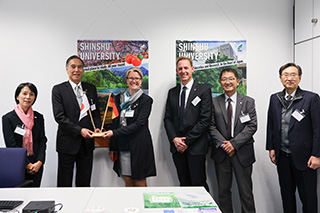Fraunhofer FIT opens doors for Far East cooperation
On October 31, the Fraunhofer Institute for Applied Information Technology FIT opened the Satellite Office, a place of cooperation and exchange between Germany and Japan. Fraunhofer FIT welcomed Shuichi Abe, Governor of Nagano Prefecture, to the Birlinghoven campus for this special event. The focus of the versatile program was the signature of a joint proclamation between Fraunhofer FIT and Nagano. Another highlight of the visit was the exchange with representatives of the Bonn / Rhein-Sieg business location together with Düsseldorf hosting the largest Japanese community of central Europe.

More places of research and networking
During his stay, Fraunhofer FIT researchers informed the governor about current topics in applied science. The Cooperation Systems department demonstrated exciting Metaverse research projects, Digital Health provided an insight into the Life Science Lab and Human-Centered Engineering & Design introduced the topics of design thinking and prototyping.
The most important part of the itinerary involved the inauguration of the Fraunhofer Satellite Office, a workspace for Japanese researchers working in Sankt Augustin. With the new office, Fraunhofer FIT and Nagano are creating more space for cooperative activities. In future, it should also be possible for scientific staff from Germany to use a corresponding location in Japan. Prof. Dr. Stefan Decker, Director of Fraunhofer FIT, remarks: "The opening of the Satellite Office and the Joint Declaration are important steps towards a shared future with Japan."
Tackling regional challenges together
Before signing their declaration, the cooperation partners highlighted the benefits of closer collaboration. Prof. Dr. Stefan Decker made it clear in his presentation that a German-Japanese dialogue can further develop current research topics. The Japanese delegation focused on the advantages for the labor market and the joined industry. In this context, small and medium-sized enterprises also play an important role. "We now offer a supra-regional network node for the transfer of research to SMEs. This is also Fraunhofer's mission to help companies move forward with digitalization projects," says Dr. René Reiners, Head of the Human-Centered Engineering & Design department, describing the future collaboration. Sabine Ganter-Richter, owner of the Network for Science, adds: "At the same time, we are also looking to technology-friendly Japan. I am convinced that both countries will benefit from each other in terms of research and transfer. The course has already been set with free trade agreements for several years."
With their proclamation, Fraunhofer FIT and Nagano promise to work together to support the academic and economic progress of their regions. The focus of this commitment lies on the exchange of scientific information, the continuous training of employees and on contact with local middle-sized enterprises.
High-profile guests from politics and business accompanied and enriched the meeting. Together with Mayor Nicole Unterseh (Federal City of Bonn) and Mayor Max Leittersdorf (City of Sankt Augustin), the German-Japanese Business Circle and the business development agencies of Bonn and Troisdorf visited the Birlinghoven campus. Consul General Setsuko Kawahara was present as ambassador for Japan in North Rhine-Westphalia. Both Bonn-Rhein-Sieg University of Applied Sciences and the University of Bonn contributed their academic expertise.